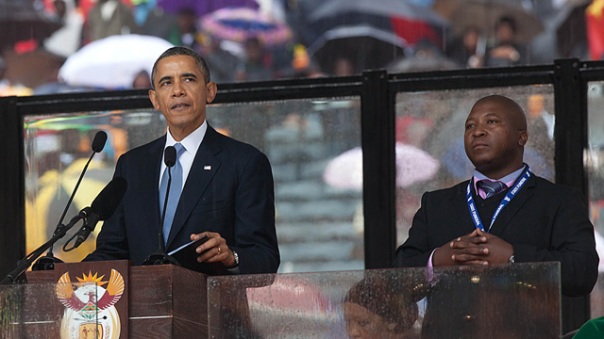When the news that the interpreter at Mandela’s memorial service came out yesterday, I tried to write up a quick analysis that pointed out the systemic problems that led to the now-famous incident in Johannesburg. Today, more information has come out about the interpreter.
Jantjie
In an interview, Thamsanqa Jantjie (the “fake interpreter”), made several important statements, which I want to think through. (Articles on CNN, Daily News, and USA Today.)
1. He claimed that he is a schizophrenic and he was suffering from a hallucinatory episode on stage, which explain why his interpretation was gibberish.
I am skeptical that Jantjie’s incomprehensible signing can be explained as the result of a psychological event. I don’t believe that hallucinations lead to apraxia (the inability to produce meaningful language). If anything, hallucinations lead to hyperactive language production. Also, a psychological event would likely impair much more than just language production, and I can’t understand how he could continue for so long on stage under these conditions as if nothing were going on. If we remember the case of the reporter who had the stroke on the air, that was a case where language production rapidly disintegrated into apraxia of speech (see video here). But this isn’t something that you can keep up for hours on stage.
2. He claimed that his hallucinatory episode resulted in temporary hearing loss, which effected his ability to interpret.
This explanation contradicts the last one. In this explanation, the hallucination impaired or conflicted with his ability to hear, in which case he couldn’t interpret reliably. As every interpreter knows, you don’t lose your ability to sign fluently just because you can’t hear your source message. Again, even during a hallucination, my understanding is that your language (spoken or signed) might not make logical sense to other people in the room, but that doesn’t mean that it’s grammatical gibberish.
3. He claimed that his he has interpreted often at public events and no one told him his interpretation was wrong.
The news outlets have already found evidence of prior complaints about this interpreter, so this doesn’t seem to hold up on factual grounds. But this explanation also seems to backpedal against the other two. In general, I’m not sure I can even begin to make sense of what happened on stage, how Jantjie ended up there, and if he even recognizes the gravity of the insult to the Deaf community and professional interpreters.
Bigger Problems than Jantjie
Let’s not get too distracted, however. As I stated in my post yesterday, this entire wretched debacle is not really about Jantjie. It’s about the socially acceptable level of ignorance and injury that the Deaf community is forced to live with regularly. How many times does this happen in South Africa when the cameras are off? How many times each day does it happen in the U.S. when a Deaf individuals shows up to school or a doctor’s appointment with an unqualified “interpreter” who took a few classes at a community library? The media will clamor for a few days over the details of Jantjie, government agencies will point fingers at each other until the spotlight shines elsewhere, and we’ll be back in a world where little has changed.
Will our professional organizations find a way to capitalize upon this moment to publicly point out the egregious ignorance about interpreters and the Deaf community? Can we be ready to use a public event like this to send a message here in the U.S. and everywhere in the world?


Liked – and tweeted… yet again Austin, you speak a voice of critical reason into the midst of something that’s fragmenting into multiple, confusing strands.
I’ve been retweeted at least twice on it – so I hope this draws some more traffic to your blog 🙂